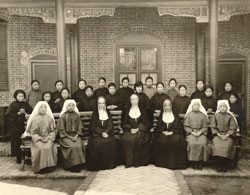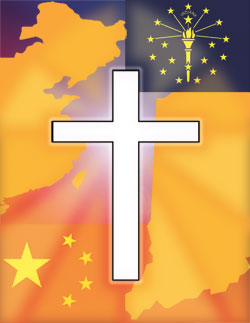Sisters of Providence consider returning to minister in China

In this undated photo, seated in the middle of the front row, are three members of the Sisters of Providence of Saint Mary-of-the-Woods, who were among the order’s first missionaries to China in 1920: from left, Sister Marie Patricia Shortall, Sister Marie Gratia Luking and Sister Mary Margaretta Grussinger. Surrounding them are the earliest postulants and novices of the Sister-Catechists of Providence, a religious order of Chinese women founded by the Sisters of Providence. (Submitted photo)
(Editor’s note: On June 30, Pope Benedict XVI issued a groundbreaking letter to the Church in China, which for decades has been troubled by division and persecution. The following is the second of a two-part series on the connections between the archdiocese and the Church in China.)
By Sean Gallagher
Six Sisters of Providence walked out of their congregation’s Church of the Immaculate Conception at Saint Mary-of-the-Woods on Sept. 29, 1920, and entered cars that were to take them away from their motherhouse.
The long road from the church to the main gate of the property was lined by students, postulants, novices and professed sisters.
They were bidding farewell to the sisters who were the first American women religious missionaries to China.
It was the climax of a day that saw Bishop Joseph Chartrand present the sisters with missionary crosses that had been blessed by Pope Benedict XV.
“Take this crucifix,” the bishop told each sister. “May it be your companion in your apostolic labors and your consolation in life and at the hour of death. Amen.”
The sisters would labor intensely in their ministry in Kaifeng in northern China. And they would need consolation in abundance over the course of the next three decades as civil war and World War II engulfed the land and the people to which the sisters came to serve as missionaries.
They lived as prisoners in internment camps from 1942-45. And in 1948, the missionary sisters from Indiana, along with members of the Missionary Sisters of Providence—a new religious order comprised of Chinese women—fled to Taiwan when communist forces were nearing victory in China’s civil war.
The ministry of the Sisters of Providence and the new congregation they founded have grown over the nearly six decades they have been in Taiwan. A central sign of their fruitfulness is Providence University in Shalu, Taiwan, which today has an enrollment of approximately 20,000 students.
But the memory of mission ministry in mainland China has endured with the Sisters of Providence of Saint Mary-of-the-Woods and now, nearly 60 years after they were forced to leave it, they are contemplating a return.
A small beginning bearing fruit
According to the sisters, a member of their congregation has lived in China for more than a decade.
However, the nature of her ministry and her identity is officially concealed because of the way the Chinese government oversees religious activities there.
“Religious congregations from foreign countries really cannot enter China as a group, as a congregation,” said Providence Sister Paula Damiano, a general officer of her congregation and a part of its leadership team.
“There are foreign men and women religious who are in China, who are not identified as religious women or men, who work in a variety of positions. Often, they’re teachers or start kindergartens—whatever their skills allow them to do.”
It was through her work that the Providence sister living in China met Anji Fan.
Born during the middle of China’s tumultuous Cultural Revolution to a family that had been Catholic for generations,
Fan and her relatives experienced religious persecution from her earliest years.
“We weren’t allowed to hang icons and we had to hide [our] prayer books under the mattress,” Fan said. “So we had to pray in secret. We really couldn’t tell our friends we were Catholic.”
When the Cultural Revolution subsided after Mao Zedong’s death in 1976 and Deng Xiaoping eventually came to power, Fan eventually was able to worship openly in a church connected to the state-sponsored Chinese Catholic Patriotic Association.
Her mother and many other Chinese refused to register with the government, and are members of what is known as the “underground Church.”
In his recent letter to the Church in China, Pope Benedict XVI called all Chinese Catholics—both those who are part of the patriotic Church and those who are in the underground Church—to reconcile and grow in unity.
Fan later went to college and studied medicine. It was while she was working as a psychiatrist that she met and befriended the Providence sister living in China.
Fan eventually discerned that God was calling her to become a member of the Sisters of Providence of Saint Mary-of-the-Woods.
She made the long journey from her home in central China to western Indiana in 1996 and joined the order, making her final profession of vows as Providence Sister Anji Fan in 2006.
The signs of the times
 Although she is open to whatever mission field God might call her, Sister Anji is encouraged by discussions in her congregation to send more sisters to China.
Although she is open to whatever mission field God might call her, Sister Anji is encouraged by discussions in her congregation to send more sisters to China.
“It’s exciting because it’s where I came from, and it’s where my cultural roots are,” she said. “It was my original dream to be able to serve the people in China. For now, I’m trying to be open to see what God has planned for me in my life.”
In their deliberation about the nature of their mission to China, the Sisters of Providence have paid close attention to the signs of the times—developing trends in the country’s broader society.
For years, the Chinese government has enforced a policy that has allowed families to have only one child. The Sisters of Providence see a problem looming on the horizon for China because of this policy.
“In the coming years, one couple will have to be responsible for four parents because both will be the only child of their family,” Sister Anji said. “So we are looking at [establishing] senior homes, senior centers, adult day care. Who is going to be responsible for the older folks? This will be a big need.”
A trend that the sisters have seen among Chinese Catholics is their tremendous devotion to their faith.
“Christianity is spreading in China,” Sister Paula said. “People really are thirsting for it. I have been to both a patriotic church and an underground church and they’re filled with young people—standing room only. There’s just an extraordinary hunger.”
This hunger is expressing itself in the desire of some Chinese women to join the Sisters of Providence.
Providence Sister Jenny Howard, the order’s vocations director, recently met many of these women on a recent trip to China.
“They had visited our Web site,” she said. “They’re familiar with us at a distance, in a sense. But there was that feeling that they really did have a call to religious life and very possibly the Sisters of Providence of Saint Mary-of-the-Woods.
“I think they would have gotten on the plane and come home if we could have worked that out.”
One of the challenges of working that out is a linguistic one. Most know little, if any, English.
One sphere of ministry the sisters are considering for a possible future mission to China is in religious formation there.
Trusting in Providence
Whether it is in elder care, a possible educational ministry or in religious formation, Sister Paula looks to the Gospel for the purpose of her congregation’s future mission to China.
“Our hope is that, in the next few years, we will have a couple more sisters who [will] go to mainland China,” she said. “They’ll just act as leaven, to help people, to respond to their needs, to really work with women who are interested in learning more about religious life.”
And even though government restrictions make being that leaven more difficult, Sister Paula said that her congregation’s trust in God’s Providence keeps them from being discouraged and continually opens them up to new possibilities.
“Who knows what will happen in the next two years,” Sister Paula said. “It may be that things will open up so that they will welcome foreign religious congregations into the country. So we’re prepared for anything.” †

